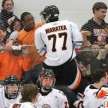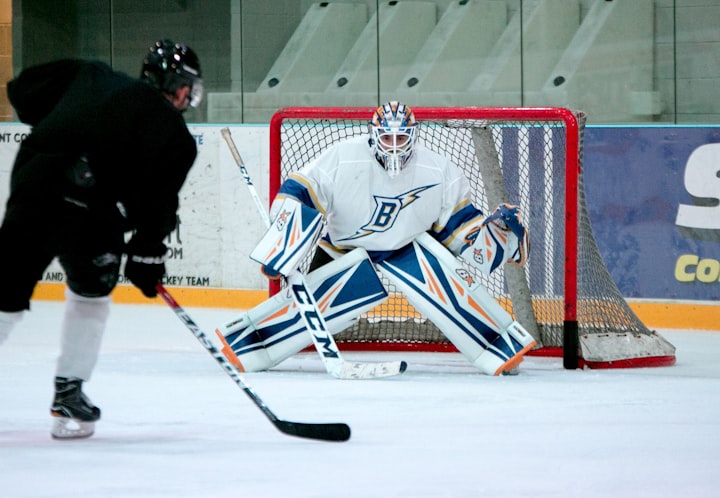Learning From The Bench: Year 1 in Coaching
What I’ve Learned About Hockey and Life
What a crazy year to just jump right into it, right?
I’ve been involved in hockey for over 20 years now. I started at 9 years old, which is late by today’s standards, and now at 29 years old, I am fresh off of my first season as a “head” coach. If you ask most coaches, they’d say they learn as much or more than they teach their players. I am no exception.
I have always loved the game and played at the house, travel, prep school, junior and college levels. I’ve been on benches, helped out with teams in the past, but this was my first foray at the reigns of my own team. It was a high school team, the middle team of three. Resting between the Varsity AAA team and the JV team, my first year with the Varsity A team was everything I could have asked for and more.
Here’s some of what I learned…
Time Moves Differently
As a player, I was never in love with going to practice. I enjoyed seeing my teammates and friends, being on the ice, and performing general hockey activities, but drills and hard work were never my idea of a good time in the middle of the week. With homework, social life, and the other distractions of life abound, it took up time that I didn’t really feel was productive for myself athletically or with my school and social schedule.
As a coach, I found myself on the opposite side of the coin. I had to create fun, useful practices with no real guarantee that there would be any practice time. That time moves a lot faster when you’ve got the whistle. It becomes your job to keep up the energy, variety, and competition. That time moves fast. If you let a drill go too long or can’t explain and demonstrate a drill in a timely manner you could lose the flow of your entire practice.
It was a crash course in time management.
Creating A Unit
This was the most unique challenge of the year for me personally. I am a laid-back person by nature and I tend to get along well with everyone. I do not have much experience being an authority figure. As the coach, the team takes on a part of your personality and ultimately you are the leader at every practice, game, team function, email, etc etc.
The pandemic year added an extra wrinkle to the team cohesion in the fact that the boys weren’t getting that normal level of socialization during the day. They weren’t hanging out in between classes, having lunch together, spending all the time they normally would during a day and week. Especially with freshmen coming in and not having the ability to truly ingratiate themselves into the school and the team, the practice could become difficult to manage as everyone was eager to catch up and enjoy each other’s company. Sometimes you have to let it happen, more so than usual.
I found that over the course of the season it was better to be more casual. I was the support, and our pandemic pace was going to be different from a regular year. The main goal was to make practices fun to be around, to have a team and unit that liked each other. A team like that will go to bat for each other during a game, and mine did.

It’s A Full-Time Job
So technically it isn’t, but it will become one if you aren’t careful, or if you care enough.
Hockey for me was one of those things that really get into my head. At all times I found myself juggling lines in my head, rearranging defensive pairs, plotting out goalie schedules. You print labels for the lineup cards for the scoresheet. Then you realize you have to buy labels, format the list the right way on the computer, and then print. Buying whistles, keeping your own skates sharpened, making sure you’ve got pucks, tools, a skate stone for mid-game or practice adjustments.
You’ll end up invested almost immediately and that’s a great thing. Once you’re in your in though, so you have to be very careful about deciding what you can and can’t take on. Once you’ve made the commitment you’re going to want to stick to it, and the parents and players will work with you as long as you do.
It Isn’t About You Or How You Played
Many coaches are former players, and we all have our own stories and philosophies when it comes to the game of hockey. Just because we have them though, doesn’t mean that it is ultimately what becomes our game plan.
You have the players that you have, and all of them will have their own unique skill sets that may or may not match yours, and attitudes that might not jive with your own. Rather than push the players towards what you would do, you have to meet them at their strengths. If you have a more finesse player and you were more physical, you can teach them the reads or tells they might give. If you were a more defensive-minded player then you’ll have to work with your offense in a more open and communicative manner. Let them flourish a bit more creatively and focus on helping them learn reads and different tricks.
As you go, you’ll find out which of your stories or anecdotes fits best that will help push forward your team and your relationship with your players. It takes time to lay the building blocks and foundation for these things though. After you’ve taken the time to build a rapport with your players these lessons can take root.
Let Them See You Have Fun
It’s the biggest thing. When you can show your players that you love coming to the rink, enjoy seeing them, are willing to get involved, it makes all the difference.
You can learn a lot in the coaching books, or USA hockey clinics, or from talking to other coaches. If you’ve learned or been reminded of anything by me let me know, and leave your own tips if you’ve got them as well!
About the Creator
Matthew Maratea
Young writer with just enough to say. I love sports, beer, and anything to do with the art or craft of writing. I'm doing my best to hone it here, I hope you enjoy it! If you like it follow me on Twitter and Instagram at @mmaratea22







Comments
There are no comments for this story
Be the first to respond and start the conversation.